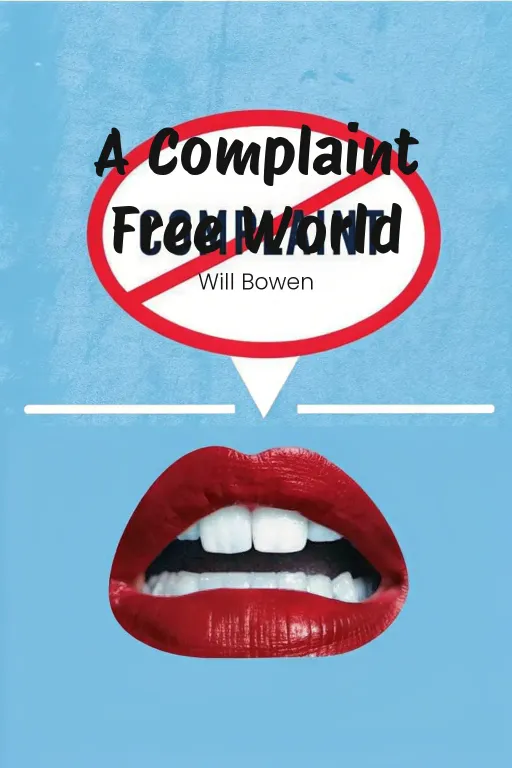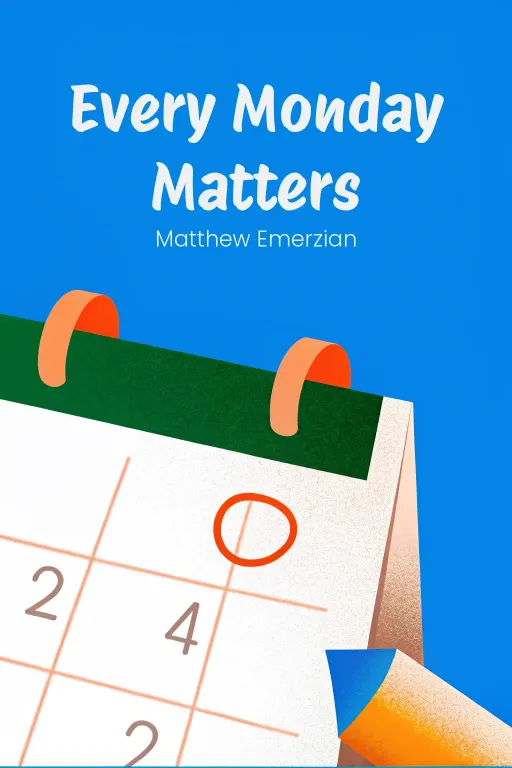
Gripe-Free: Transform Your World. Seriously.
Podcast by Beta You with Alex and Michelle
How to Stop Complaining and Start Enjoying the Life You Always Wanted
Gripe-Free: Transform Your World. Seriously.
Part 1
Alex: Hey everyone, welcome to the show! Let's kick things off with a quick question: when did you last find yourself complaining about something? Was it the crazy traffic, the unpredictable weather, or maybe just that lukewarm coffee this morning? Ring any bells? Michelle: Oh, you bet. If complaining was an officially recognized competitive event, I reckon most of us would be bringing home the gold, myself definitely included. So, Alex, are you about to tell me it's time to ditch my daily dose of grumbling? Alex: Precisely! That's actually the whole theme of today's episode. We're diving into A Complaint Free World by Will Bowen. It’s a book that promises a complaint-free existence and a chance for genuine happiness and stronger bonds with people around you. Michelle: Huh. So, happiness and harmonious relationships through…not complaining? Sounds a little too good to be true. What's the catch here? Alex: Well, there's no real "catch," Michelle, but it does involve a challenge—one that’s surprisingly tough. Bowen suggests wearing a "Complaint Free" bracelet to keep track of every instance you criticize, blame, or yes, complain. The aim? To make it through 21 consecutive days without having to switch the bracelet to the other wrist, which would mean you've slipped up and complained. Michelle: Okay, that sounds like a recipe for frustration. I imagine Bowen doesn’t just hand you the bracelet and say, "Good luck!" Alex: Not at all! The book explores the root causes of why we complain in the first place, and it really highlights the negative impact it has on our mental and physical well-being. Plus, he gives you easy-to-follow, practical steps to break the complaining habit once and for all. Michelle: And when you say "break the habit," you're not suggesting we pretend everything's sunshine and rainbows when it's obviously not, right? Alex: Definitely not. Bowen provides you with tools for trading toxic complaining with gratitude and real problem-solving. Then, we'll talk about how this shift—on a personal level, and even in a wider community—can set off a wave of positive change. Michelle: Alright, so, today we're tackling three main ideas: the sneaky downsides of complaining, the actual steps to stop, and the broader impact that can have on those around us. Let's find out if this so-called "Complaint Free World" is worth pursuing—or if we're all destined to be perpetually swapping that bracelet from one wrist to the other. Alex: Exactly, Michelle. Let's explore the reasons “why”, the exact process “how”, and then “what happens next” when we decide to leave complaining behind. Ready to jump in?
Understanding Complaints
Part 2
Alex: Okay, so let's start with the basics—what even “is” a complaint? Before we dive into the "why" and "how," we need to understand what complaints “are”, why we do them, and, importantly, what the consequences are. Bowen emphasizes that awareness is key to change, right? Complaining might seem innocent, but it's usually more complex than we think. Michelle: Alright, Alex, lay it on me. What’s the real deal with complaining? Why do we always find something to moan about, from the traffic to the lack of avocados? Alex: Well, at its core, complaining is a way to release frustration and express dissatisfaction. But there are really three main reasons we do it. First, it's for attention or validation—a way to feel connected, at least temporarily. Think of that colleague who always complains about their commute. They're probably looking for sympathy, hoping someone will say, "Ugh, the traffic “is” awful!" It's a strategy for acknowledgment, sure, but it often just reinforces negativity. Michelle: So, it's like bonding over shared misery – a kind of social currency. But doesn't that eventually backfire? I mean, who wants to hang around someone who's always complaining? It's like they're sucking the joy out of the room. Alex: Exactly! Bowen actually talks about someone who constantly played the "poor me" card, always going on about their bad luck. At first, people were drawn in because we're naturally empathetic. But eventually, it became exhausting, and instead of connecting with people, they pushed them away. Complaining starts as a cry for attention, but it can ironically lead to isolation because negativity is a repellent. Michelle: So, they're trying to make friends by moaning, but they end up scaring everyone off? That's definitely counterproductive. Okay, that's attention-seeking. What's the next reason? Alex: The second big one is shifting responsibility. Complaining lets people avoid blame or responsibility for their own actions. Say someone misses a deadline. Instead of admitting, "I didn't manage my time well," they blame external factors—"The traffic was terrible," or "The team didn't give me the resources!" It might protect their ego in the short term, but it creates a pattern where they don't reflect on their own behavior, and that really slows down personal growth. Michelle: Ah, the classic blame game. I get it, though – it's way easier to blame "the system" than to admit you messed up. But what does that do in the long run? Doesn't it erode trust, especially at work? Alex: Absolutely. If someone is always shifting blame, their colleagues will eventually lose faith in them, right? That lack of accountability damages relationships and leads to stagnation, both professionally and personally. So, yeah, complaints might shield our egos, but they also undermine our credibility and hinder progress. Michelle: Okay, so far, complaining's looking pretty bad – alienating your friends, ruining trust at work. What's the third reason people do it? Alex: The third reason is the (often mistaken) belief that complaining will actually change things. A good example is someone saying, "These meetings always suck!" without offering any actual solutions. They might think they're pushing for improvement, but because the complaint lacks direction, it usually just makes things worse. Constructive feedback, on the other hand, that's what drives change. It's really different from complaining, even though they might seem similar sometimes. Michelle: That's a great distinction. Complaining is like throwing spaghetti at the wall, hoping something sticks. Constructive feedback is more like… carefully choosing the right ingredients to make the dish taste better. One is chaotic, the other is thoughtful. Alex: Exactly! People often think complaining is action, but unless it's paired with a plan, it rarely leads to any meaningful change. Michelle: Alright, so we've got the three big reasons: attention-seeking, avoiding responsibility, and a misguided attempt to influence things. But what about the consequences? It sounds like they go beyond just being annoying at parties. Alex: Oh, definitely. Let's talk about the social and emotional costs, because they are significant. Emotionally, habitual complaining actually increases negativity and stress, instead of releasing it. Bowen even cites research that links chronic complaining to higher cortisol levels, which can cause things like headaches, digestive issues, and even sleep problems. Michelle: Makes sense. I mean, have you ever talked to someone who always complains and felt like you needed a nap afterward? It's exhausting, even just listening to it. Alex: Totally! And there's a great example in the book about a father who was struggling with anger and blame after his family dog died. His constant complaints about the driver who was responsible really consumed him, and it strained his relationship with his daughter, who was also grieving. It wasn't until he reflected and realized "those who hurt, hurt," that he was able to shift from anger to healing. Complaining was keeping him stuck in his grief, preventing him from moving forward. Michelle: Wow, that's powerful – it shows complaining isn't just ineffective; it can actually make things worse. But it's not just personal, right? It spills over into social situations too. Alex: Exactly, and it can really damage relationships. For example, if one partner in a marriage is constantly complaining, it can trigger defensiveness or resentment in the other. Then you're in a cycle where neither person feels heard or understood. Bowen also talks about how complaining spreads negativity in groups, almost like a disease. Imagine someone complaining during a team meeting – you'll often see others jumping in with their own gripes, and the whole discussion devolves into a competition of grievances. Michelle: Like a downward spiral made of misery. So you're saying complaining isn't just harmless venting – it's like emotional quicksand, dragging everyone down with you.
Developing Awareness and Tools for Change
Part 3
Alex: Exactly. So now that we’ve really dug into understanding complaints – what drives them, what they lead to – now comes the shift. By seeing how much complaining actually hurts us, we can start to become more aware of it and develop strategies to cut back. That's what we're going to get into now: practical tools and practices to break the cycle. This is the “how-to” part, the application phase. Michelle: Good, because I was starting to worry we'd just identify this huge problem and then leave everyone hanging! So, how do we actually go from being habitual complainers to… reformed optimists, I guess? Alex: Let's start with building that self-awareness. It's key because most complaining is totally unconscious. That’s where Bowen’s G.R.I.P.E. model is so useful. It's an acronym: Get Attention, Remove Responsibility, Inspire Envy, Power, and Excuse Poor Performance. He says these are the main reasons we complain. So, the first step is figuring out which category your complaints fall into, and why. Michelle: G.R.I.P.E., okay. Walk me through it. Let’s start with "Get Attention." Why is that one so common? Alex: Well, we've all, knowingly or unknowingly, whined for attention at some point. It's really rooted in the need for connection. Bowen uses the example of the coworker who's always complaining about small stuff - like a broken printer or burnt coffee. Sounds trivial, right? But really, they're fishing for sympathy, wanting validation that their frustration is justified. Michelle: So, it's like a roundabout way of shouting, "Notice me!" Okay, but – and this is my problem – what's a healthy alternative? I mean, if someone is really craving connection, how do they stop themselves from griping about petty annoyances? Alex: A really useful strategy is to consciously reframe the conversation. Instead of launching into complaints, they can ask questions or talk about something positive. So, instead of moaning about the coffee machine, they could ask, "Hey, what was the best thing that happened at work today?” It shifts the focus and creates a much more positive vibe. Michelle: Alright, makes sense. But that leads us to the second one: “Remove Responsibility”. This one sounds like an emotional escape hatch. "It’s not my fault, it's them." Alex: Exactly! These complaints are a way of avoiding accountability. Bowen talks about the coworker who blames mismanagement or lack of resources when they miss a deadline. There might even be some truth to it, but these complaints let them stay passive instead of dealing with what they can control. Michelle: So, instead of looking at their role, they create a "not my fault" story. But Alex, let me push back a little. What if the complaints are actually valid? What if the resources are lacking, and the management is terrible? How can they move forward without sounding like they're just griping? Alex: That's a great point. It’s about shifting from reacting to proactively problem-solving. Instead of just venting, they can reframe their frustration into actionable steps. Start asking questions like, “What can I change myself?” or “How can I address this constructively?” It avoids the negativity spiral and sets a solutions-oriented tone. Michelle: Sounds good in theory. But let me give you a real-world example: the internet goes down right before a critical deadline. Am I supposed to just calmly meditate until the Wi-Fi comes back? Alex: Of course not! It's okay to acknowledge the frustration, but even then, aim for mindfulness – respond in a way that helps fix the problem. So, instead of “This is unbelievable! How am I supposed to work?" it could be “Okay, what can I do right now? Who can help me out?" The point is to redirect that energy toward problem-solving. Michelle: Got it. Less time panicking, more time fixing. Okay, let’s keep going. “Inspire Envy” – that sounds like it's connected to competitiveness. How does complaining factor in? Alex: Definitely! Some people complain to elevate themselves by making their circumstances seem "worse" or their challenges more “unique”. It’s a subtle way of positioning themselves as superior through suffering. Something like, “You only worked eight hours overtime? I had to do twelve!” Misery becomes this weird badge of honor. Michelle: A “my suffering is bigger than yours” competition. Sounds like fun at parties… But practically speaking, how do you get someone – or yourself – to stop turning complaints into status symbols? Alex: The key is shifting from competition to gratitude. Ask yourself, "What opportunities has this challenge given me?" or "What can I learn from this?" Seeing adversity as a chance for personal growth takes away the need to compete and makes the struggles meaningful without triggering jealousy. Michelle: Okay, that's a lot to absorb. Let's just pause the G.R.I.P.E. model for a minute—people are probably thinking, “This is too hard to do daily!” And that’s where your Complaint Free bracelet comes in. Alex: Exactly! The bracelet is a tool alongside the G.R.I.P.E. model to become more conscious. Every time you catch yourself complaining, you switch the bracelet to the other wrist. Ideally, you want to go 21 straight days without complaining, so it is very important to recognize that conscious effort is essential for breaking any ingrained habit. Michelle: So it’s basically an experiment. Isn’t this more of a "failure loop"? If you need to reset constantly, it will make people feel worse instead? Alex: That's a fair concern, but Bowen sees it differently. He emphasizes progress over perfection. Every reset is a chance to reflect, learn, and improve. Leigh in the book switched the bracelet every hour, especially during her commutes. It became a wake-up call. As she reframed complaints, like traffic frustration, into moments of gratitude, she rewired her habits. Instead of reinforcing failure, the bracelet became a mirror for self-awareness and growth. Michelle: Alright, that's a clever method. You can’t solve it if you don’t see it. Fine. But those who live with serial complainers? Toxic workplaces, families—complaints thrive like weeds? Alex: It’s about mindful communication and intention. It’s not just about personal awareness, but also recognizing and addressing toxic environments. It’s about setting an example, sharing these tools, and shifting group dynamics towards positivity. Bowen's example of families doing the bracelet challenge together grows collectively. Over time, environments fill with encouragement and gratitude. Michelle: What you’re saying is essentially be the change you wish to see. Okay. Keep talking, Alex—I think I’m almost sold on this.
The Ripple Effect of Complaint-Free Living
Part 4
Alex: With the awareness and tools we’ve discussed, the next natural step is to look at how moving from complaining to gratitude can really reshape both our personal lives and our social circles. That leads us to today's topic: The Ripple Effect of Complaint-Free Living. Michelle: Okay, so we're not just asking, "How do I shut down the complaint department in my own head?" but "What happens after I do?" That's a bigger question. Alex, are you suggesting that one person toning down the negativity can actually change the vibe of their entire world? You know, their family, their workplace, their community? That sounds… optimistic to me. Alex: Well, Michelle, I’ll admit "optimistic" is a fair assessment but hear me out. The ripple effect, as a concept, is wonderfully simple. By complaining less, you absolutely shift your own mindset. But it doesn't stop there. You then influence the people closest to you and, eventually, entire communities. And the cool thing is, there's real evidence backing this up. So, let's unpack it, step by step, starting with how all this shows up at work. Michelle: The workplace? Now that's a place where complaints really seem to flourish, don’t they? From the coffee machine grumbles about traffic to the quarterly report moans, offices are like, negativity incubators. Alex: That’s precisely why the workplace makes such a compelling example of this ripple effect. Will Bowen, in his book, gives several examples, but let's zoom in on Gary Hild, an executive chef. Kitchens are notoriously high-stress environments, right? And Gary had really bought into that, constantly pointing out mistakes and generally magnifying the stress. It dragged everyone down – himself included. Michelle: Oh, I can just picture it. Criticism flying faster than orders on a Saturday night? Alex: Yes, but far less fun. It was ultimately destructive. The really fascinating part, though, is how things changed when Gary embraced Complaint-Free principles. He started framing mistakes as learning opportunities, focusing on solutions instead of blame. If a dish wasn’t right, instead of yelling at the team, he actually created a space for constructive feedback. The team responded by becoming more proactive and innovative, knowing they weren’t going to get crucified for making an honest mistake. Michelle: Okay, hold on. One guy decides to stop complaining, and suddenly, his entire kitchen staff transforms into some kind of support group? That’s a pretty big jump, isn't it? Alex: It wasn’t magic, Michelle, it was basic human psychology. Complaining often creates defensiveness, while gratitude and constructive communication foster trust. By changing his communication style, Gary helped establish an environment of open dialogue and mutual respect, which naturally boosted morale and productivity. His team didn’t just perform better, they took that positive energy home with them, influencing their families and friends. That's the ripple effect playing out. Michelle: Okay, I’ll grant you, that's pretty compelling. But let's pivot a bit. Workplaces are one thing — people have to kind of get along to keep their jobs. What about personal relationships, like family? You can't exactly fire your family if things get tense. Alex: True, and family dynamics often reveal our deepest habits, including the more negative ones. Another great example from the book is Tom Alyea, a business consultant who realized all his complaining was sabotaging his relationships—especially with his wife and kids. Family dinners were basically gripe sessions: bad weather, aches and pains, messes around the house. It created a really heavy atmosphere. Michelle: Sounds less like a family gathering and more like a pity party broadcast live from the dining room table. Alex: Exactly. Tom initially thought of his complaints as a way of connecting with people, but they ended up creating more tension than intimacy. It wasn’t until he took on the Complaint-Free challenge that he realized how deeply ingrained these habits were. He started intentionally replacing those complaints with encouragement and gratitude. It was almost transformative. Instead of pointing out the messy rooms, he started asking his kids about their goals for the week. Dinner became a time for support and aspiration, rather than critique. Michelle: I can see how that tonal shift could strengthen those relationships. I mean, positivity tends to breed more positivity. But, let me play devil's advocate for a second. What happens when the people around you just… don't shift? What if you’re trying to change, but you’re surrounded by people who are world-class complainers? Alex: That’s a tough spot to be in, absolutely. But change of this kind has to start with leading by example. Bowen points out that when one person consistently shifts from critical to constructive, the people around them often start to follow suit. You can think of it as emotional modeling. They start to notice how those different responses feel and, subconsciously, start reciprocating. And even if others don’t change, a shift in your own mindset will help you navigate those dynamics with a lot more resilience. Michelle: So, lead by example and hope for the best. Fair enough. But let’s zoom out even further – to entire communities. Can this Complaint-Free living philosophy work on a societal level, or is it just a, well, a nice idea for your kitchen and your office? Alex: It absolutely can work on a community level! There are some great real-world examples. Some communities have started "Complaint-Free Wednesdays," where people consciously dedicate one day a week to mindfulness and replacing complaints with gratitude. In one town, the leaders actually formalized the idea, organizing events like storytelling about acts of kindness and hosting discussions about more constructive communication. Over time, the residents saw a really noticeable improvement in community spirit and collaboration. Michelle: A whole town buying into this? That does sound a bit like Utopia. But what's the actual mechanism here? Is it just collective peer pressure, or is something else at play? Alex: I think it's deeper than that, Michelle. When people prioritize gratitude and solution-focused communication, they're essentially creating a culture where collaboration and positivity are rewarded. Complaining, on the other hand, tends to dwell on problems without offering possible solutions, which ultimately stalls progress. Reframing the way a community communicates directly changes the way it solves problems, which can then strengthen bonds of trust and cooperation. Michelle: Hmm, I see the logic. But again, you’re describing a best-case scenario. What about schools, where you've got a lot of young people involved? Kids aren’t always known for their focus on gratitude, shall we say. Alex: That’s a fair point, but that’s precisely why this can be so impactful in educational settings! Let's consider Omaha Northwest High School. After a traumatic event, one of the students actually introduced the Complaint-Free bracelet challenge to his classmates. The idea was to encourage them to consciously replace complaints with positive reflections. Teachers found that class dynamics changed dramatically, fostering greater empathy, teamwork, and resilience. Michelle: So, you’re telling me these kids – who were probably switching the bracelet, what, ten times a day just to mess with each other – actually became more collaborative and mindful? Really? Alex: Really and truly. It actually laid the groundwork for long-term change. By starting these practices early, young people build habits of gratitude and emotional regulation that they take with them into adulthood. Schools that prioritize these values tend to see less bullying, better problem-solving skills, and stronger relationships among students and teachers. Michelle: Okay, I hate to admit it, Alex, but this whole “ripple effect” idea is starting to gain some traction with me. From professional kitchens to classrooms to entire communities… it does seem like this Complaint-Free philosophy creates a stronger foundation for just about any group of people. Alex: That’s right. It’s about so much more than just stopping complaints; it’s about consciously replacing them with expressions of gratitude and actionable solutions. When people commit to making that change, even in small ways, the benefits spread outward, impacting the people around them and, ultimately contributing to a more harmonious and connected society. Michelle: I get it. Your main point is that Complaint-Free living isn't just a personal project; it's actually an investment in your community, whether it be small or large. One person chooses to complain less, and the result is that the world becomes a little more… well, livable. Alex: Exactly, Michelle. Small, conscious changes can ignite bigger transformations, proving that positivity really is both a personal experience and something that's shared with others.
Conclusion
Part 5
Alex: Okay Michelle, wow, we really covered a lot today! From, you know, understanding why we complain in the first place, to those practical tips like the G.R.I.P.E. model and that Complaint Free bracelet challenge. And then, of course, talking about the amazing ripple effect of actually living complaint-free. I think we've made a pretty strong case that, while complaining might feel natural, even harmless sometimes, it really does have emotional, social, and even physical costs. The real key is that shift, isn't it? Moving from negativity to gratitude, and just realizing that change really does start with awareness and intentionality. Michelle: Right, and I think we should definitely emphasize that we're not just talking about individual change, right? I mean, by cutting down on the complaining, we're building healthier relationships, more functional workplaces, even stronger communities. It's like you were saying, Alex, that positivity isn’t just a personal thing, it can catch on. Although, I'm not gonna lie, actually breaking the complaining habit takes some serious effort. That bracelet challenge you mentioned? Harder than it sounds! But I guess it's about progress, not perfection, huh? Alex: Exactly! And for our listeners, I think the biggest takeaway is to just start small. So next time you hear yourself complaining, just pause for a second. Ask yourself, "Okay, how can I reframe this situation? What's the value I can actually find here?" Practice turning those complaints into real opportunities to grow and connect. These little moments really do matter… that’s where the real transformation begins. Michelle: So, whether it’s holding back one gripe during the morning commute, or choosing to be thankful at dinner, those little changes can really add up. You might even discover that creating a more positive world, well, it starts with you. You know what Alex? I gotta admit, I’m almost convinced to actually give this a shot. “Almost” reluctantly, of course! Alex: I'll take that as a win, Michelle! And for all of our amazing listeners, thank you so much for exploring this whole idea of complaint-free living with us. Please remember, it's not about being perfect, it's about always making progress. See you all next time!









